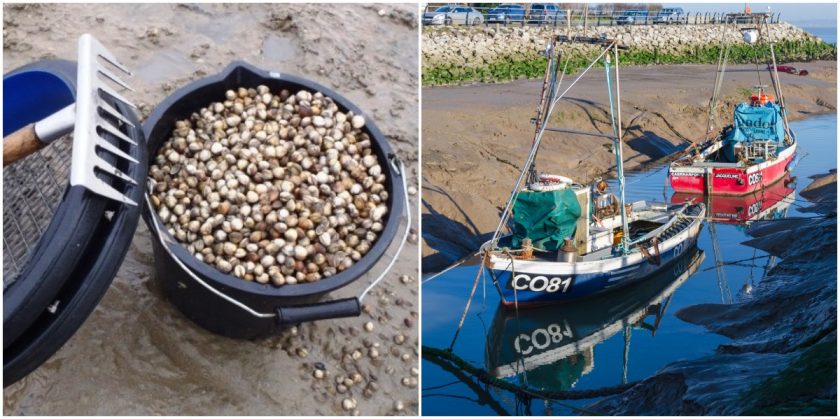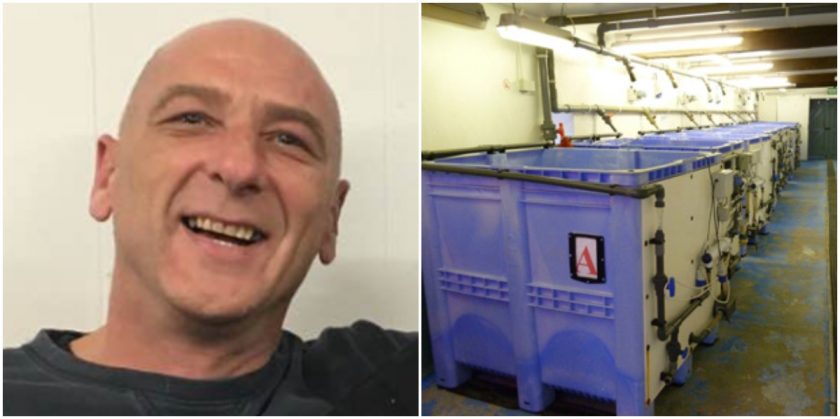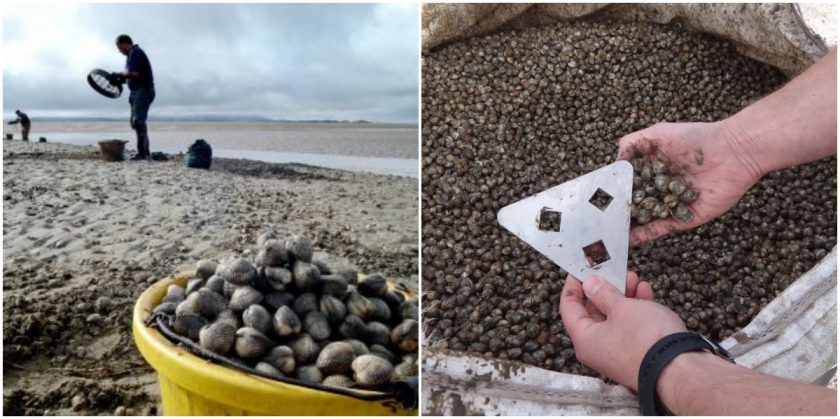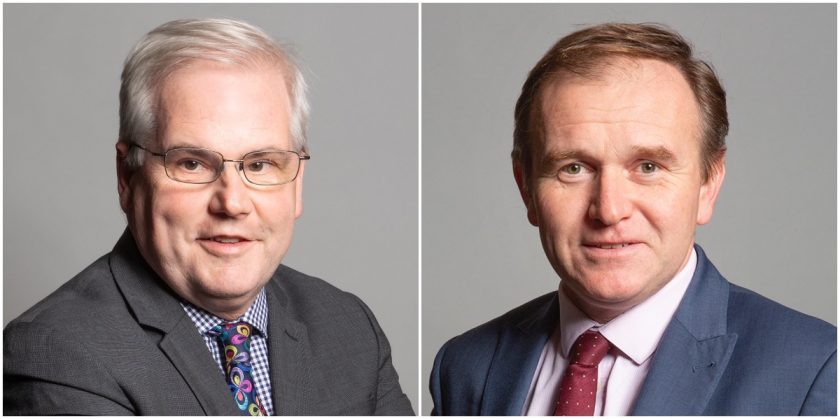Dee Estuary cockle industry is on the verge of collapse because of Brexit red tape

A Flintshire based shellfish exporter has said the Dee Estuary cockle industry is on the verge of collapse because of Brexit red tape.
Carl Harmes, the managing director of Greenfield based Deeside Depuration Centre, exports 500 tonnes of cockles to Europe annually.
He directly employs up to 10 people at the depuration centre and over 50 cockle fishermen depend on his purification plant.
Mr Harmes has been selling shellfish to Europe for over 35 years, having inherited the business from his father who spent his lifetime as a cockle fisherman.
The business has ground to a halt following a European Union ban on UK shellfish imports which came into force on December 31.
The European Commission last month wrote to the UK shellfish industry informing it that unpurified cockles, oysters, mussels, clams, and scallops caught in most British waters were banned from the EU indefinitely since the UK left the Brexit transition period.
The traditional method of exporting live cockles from the Class B waters of Wales to Europe has been using chilled transport, once on the continent, the cockles are depurated (purified) using Class A seawater.
Most waters in Wales and across the UK are classed as Grade B, and since Brexit shellfish now have to be cleaned before being sent to Europe.
But there are limited purification facilities in the UK as the catches have always been sent to the EU for depuration.

Carl Harmes MD of Greenfield based Deeside Depuration Centre
Mr Harmes said the depuration process is an “expensive business, I have to make my own ‘seawater’ but need around 3 tonnes per tonne of cockles, Welsh seawater can’t be used.”
“It also takes time, I moved the business from Caernarfon to Greenfield to reduce the transport time of the shellfish after depuration, The M56 is just a few miles away instead of two hour drive”
“Unless I can greatly increase my depuration plant, I will stop trading.”
Poor water quality in Wales
Mr Harmes said there are a number of issues causing serious harm to the future of the Welsh Seafood Industry.
“The poor quality of water around the Welsh Coast, the lack of clarity from both the EU and British government about the movement requirements and a lack of funding to assist with the changes.” He said.
“Long term the Welsh Coast needs to have improved water quality but meanwhile, additional depuration capacity is urgently needed.”
“To maintain last years export capacity, Deeside Depuration Centre must increase its plant by a factor of 10 and this will need external funding.” Mr Harmes added.
He said cockle beds are “very much like farmland fields and are regularly harvested, if this stops, as it has, but for an extended period, the beds will overpopulate and become prone to disease.”
“There is also the issue of Licences, if the current holders become insolvent and do not renew them, it would not be difficult for foreign companies to obtain them then the industry would be gone forever.”
Funding
Scottish fishermen have been thrown a £7.75 million funding lifeline by the government there, Scottish government fisheries secretary Fergus Ewing said:
“In the absence of any further clarity on resilience funding from the UK government we are stepping in to support the industry and coastal communities across Scotland and ensuring we meet the emergency needs of crews by providing welfare support through the Fishermen’s Mission.”

Mr Harmes said that if the Welsh government offered similar support, “it would make a great difference.”
“As it stands, Scottish processors are getting help to expand their depuration plants and maintain the harvesting, this problem, which could see hundreds of cockle fishermen out of work, has been caused by the way Brexit has been administered.”
“Our European customers still want my products but I am currently unable to conform to the changes required in the processing of the shellfish by the EU.”
“This is not through lack of planning on my part as the new requirement was only announced after the UK left the EU.
Yesterday the UK government opened up a £23 million ‘Seafood Disruption Support Scheme’ – the fund covers up to £100,000 of losses per business caused by delays related to the export of fresh or live fish and shellfish to the EU during January 2021.
Mr Harmes said the fund is “no different than the insurance I already have for movement of shellfish and I am not eligible.”
Politics
The decision by the EU to place barriers on live UK shellfish exports has been described as “legally wrong” and “unjustified” by UK government environment secretary George Eustice.
He wrote to the to Stella Kyriakides, EU commissioner for health and food safety earlier this week, Mr Eustice said the UK government “can see no scientific or technical justification for this change.
Mr Eustice said “we and are seeking urgent resolution of this matter, and we would welcome a meeting to discuss this.”
The Department for Environment, Food & Rural Affairs (DEFRA) had been telling UK shellfish businesses that the EU ban would last until April 21, when the EU is set to implement new animal health regulations.
But according to PoliticsHome, the Shellfish Association of Great Britain, which represents the majority of shellfish traders in the UK, wrote to members on Monday claiming that in private the government had now “changed this position” and had said that the EU’s position “is correct.”
The email seen by PoliticsHome said: “We have now received another update from DEFRA regarding the export of live-bivalve molluscs.”
“All along they have told us that they believe the trade in class B animals is legal and that the regulation supports this. They have now changed this position.”
“They now say that they believe on balance that the EU view, that the trade is not legal, is in fact correct. This is in complete contrast to everything they have told us so far.”
A DEFRA spokesperson told PoliticsHome the government’s position had not changed. “We continue to believe that our interpretation of the law and the EU’s original interpretation is correct and that the trade should be able to continue for all relevant molluscs from April.”

Alyn and Deeside MP Mark Tami (left) UK Government Environment Secretary George Eustice (right)
In a letter to Mr Harmes, Alyn and Deeside MP Mark Tami said the “worst part of this is that it is completely unnecessary.”
“The government could have negotiated a deal that maintained the status quo for seafood exports but instead has managed to devastate the British fishing industry.”
“I am acutely concerned about the impact on jobs in Alyn & Deeside that this is having, and if companies key to exporting produce go under then this will have a much longer term impact.”
“I have raised this with ministers and I will continue to do all I can to hold the (UK) government to its own promises to the British fishing industry.”
“The fact that a government minister dismissed the fishing industry’s pleas for help by saying that ‘they’re now British fish and they’re
better and happier fish for it’ is frankly an insult.”
Mr Harmes said: “It is frustrating that the UK government has turned its back on cockle fishermen and seafood processors because without their help we shall not survive Brexit.”
A spokesperson for the Welsh Government said: “As soon as we became aware of the emerging issue around the export of live bivalve molluscs from class B waters, Lesley Griffiths, the Minister for Environment, Energy and Rural Affairs made representations to the Defra Secretary of State, urging clarity on the UKG approach to resolving this issue – and we continue to work with all UK administrations and the shellfish sector to find a way forward.
“We have also called on UKG to set up support for the entire seafood sector, and we are exploring other ways of supporting the sector.”
Spotted something? Got a story? Email: [email protected]
Latest News
